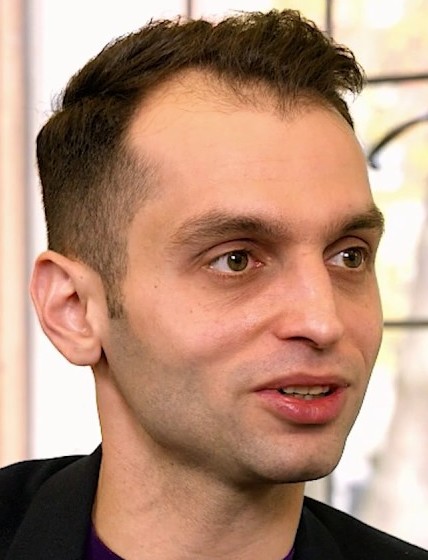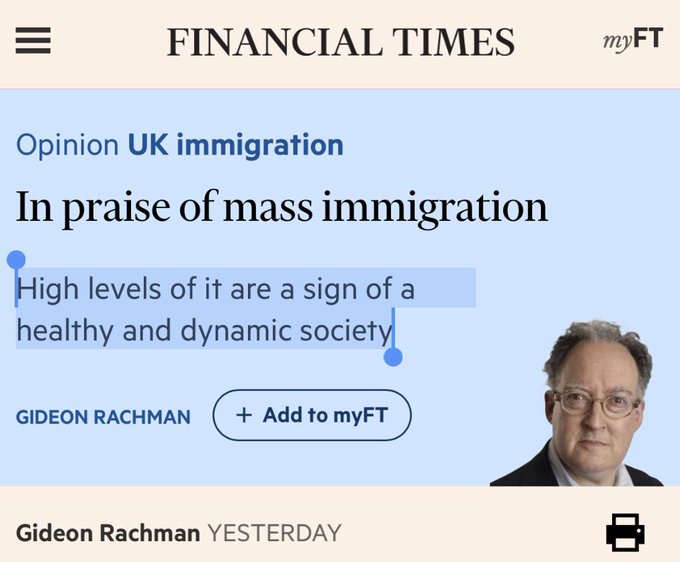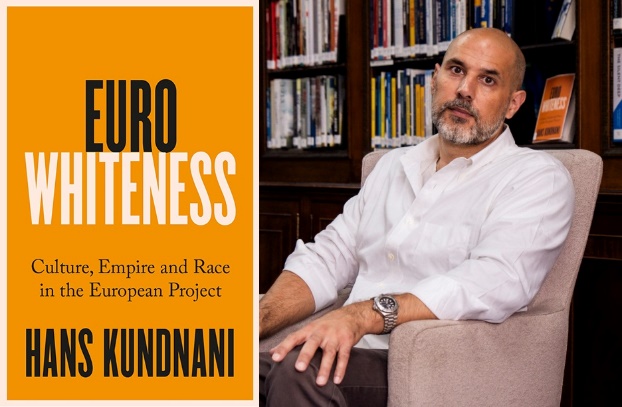A Theory of Khazars and Ashkenazi Jews
If there were Jews living in a region called Khazaria largely occupied by present-day Eastern Ukraine and part of Southern Russia, including Crimea without Sevastopol, these Jews were not Gentiles who converted to Judaism, i.e., converts. Attracted by the strategic proximity of the Khazarian capital Itil to a number of important caravan routes, these Jews — who were merchants and slave dealers, mostly rhadanites or rabbinic Jews from Persia and the Middle East, active in the slave trade between Christendom and the Muslim world — settled there in large numbers between the eighth and tenth centuries. “By the 8th century” writes French historian Laurent Guyénot, in an excellent article on the life and work of famed Russian historian and ethnologist Lev Goumilev,
they formed a foreign elite and gained increasing political influence. The situation came to a head at the beginning of the 9th century when a Jewish prince took power and made rabbinic Judaism [talmudism] the official religion of the state. A bloody civil war ensued, which the Jewish caste won by using mercenaries. Although the mass of ethnic Khazars was eventually forced to submit to the authority of the Jewish elite, they never converted to Judaism, which remained exclusively the faith of the political authorities, according to Goumilev. With this, he concludes, Khazaria was transformed into a ‘social-political chimera ruled by a Jewish trading elite, with the original ethnic Khazars becoming subjects of ‘a state that was alien to them in terms of ethnicity and religion.’ (1)
This Jewish hostile elite was eventually subdued at the end of the tenth century by the Kievan Rus’ led by Prince Sviatoslav. Their empire collapsed and the surviving Jewish Khazars dispersed throughout Eurasia and Europe. Some retreated to the Crimea, others fled to the West. “Many,” according to Goumilev, “remained active in the Russian lands, encouraging hostilities between the Russian princes and inciting the steppe peoples to attack the Russians.” (2)
To recap, Jewish Khazars did indeed rule over Khazaria between the eighth and tenth centuries but they were not converts, i.e., gentiles who converted to Judaism. According to Wikipedia, this purely speculative theory on the Khazarian origin of Ashkanezi Jews was first developed by a French philosopher named Ernest Renan. It was then popularized by Arthur Koestler in his book, The Thirteenth Tribe: The Khazar Empire and Its Heritage. (3) More recently, extremely left-wing Israeli historian Shlomo Sand, the author of The Invention of the Jewish People (4) argued that because Jews are mostly descended from Khazar converts, they do not constitute a nation or need a state of their own. Likewise, Arabs have long cited the Khazar myth in attempts to deny a Jewish historical claim to the land of Israel.
Several historians who are aware of the apologetic nature of its hypothesis rejected this theory. (5) A crucial difficulty right from the start is in the word “Ashkenaz” which means “the West,” (6) i.e., Jews of England and France who after their expulsion from these countries moved to Germany and Eastern Europe into an area designated by the Russian government as the “Pale of Settlement,” the great medieval haven of Jewry. This area included Poland, Ukraine, Belarus, Lithuania, and Bessarabia. These regions which were also inhabited by the Jewish remnant of the Jewish Khazaria empire were part of the Russian Empire, but not of Russia as such. (7)
The fact that Ashkenazi Jews speak a language based on German (Yiddish) rather than a language based on Turkish is an additional difficulty. Moreover, it is unlikely that the highly literate Ashkenazim would retain no trace of their Turkish origins. (8) Finally, genetic evidence also weighs heavily against such a hypothesis. According to Jewish journalist Tina Hesman Saey:
Large-scale genetic studies have shown that today’s diverse Jewish communities have remarkable genetic cohesion. The Jews of Iran, Iraq, Yemen, North Africa, European Ashkenazi and other Semitic groups all originated in the Middle East. A common geographic origin can be observed for all major Jewish groups studied. This genetic research clearly disproved the story of the Khazars: a pre-10th century Turkish-Asian empire that converted en masse to Judaism. The researchers compared the DNA signatures of Ashkenazi Jews with those of people of Turkish descent and found no match. The DNA results support the hypothesis that the paternal gene pools of the European, North African, and Middle Eastern Jewish communities originated from a common ancestral Middle Eastern population, and suggest that most Jewish communities remained relatively isolated from neighboring non-Jewish communities during and after the diaspora. (9)
The Khazars have nevertheless become a kind of all-purpose device, a sort of strawman or red herring used by Jews and non-Jews alike. The idea that the Ashkenazim are not Semites but converted Khazars is a trick that is widespread on social media, allows non-Jews to safely vent their hate of Jews and of Israel. Some sincerely believe this legend is true since it is so widespread, others are just trying to escape a life-threatening accusation of antisemitism, the only anathema still punishable by social death, even assassination. And if you are Jewish, blame the Khazars for whatever bad deed you are accused of. If Ashkenazim are in fact converts, this implicitly means that the real Semitic Jews from the Holy Land, the real “chosen people” are not responsible for their actions. Arthur Koestler, for example, uses the Khazar conjecture to defuse racial antisemitism, which, from his point of view, would be misdirected, since he supposes that Ashkenazi Jews are not Semites. Thus, if for some reason Ashkenazim behave badly, evangelical Christians, for example, and all Christians for that matter, who are convinced that the Jews are God’s chosen people, will be able to continue fooling themselves since the bad Jews in question are not real Jews, but impostors. (10)
Professor Revilo P. Oliver, one of the greatest American White conservative thinkers of the last century, had the following interesting insights on the subject of the Khazars:
During the past century, many Christians who resented the depredations of the Jews, chiefly Ashkenazim, but wanted to retain faith in their favorite story book, elaborated the theory that their parasites were not really God’s People but only the descendants of Khazars who had been converted to Judaism. The theoretical evasion was so attractive to them that it became an article of Faith, and it was finally adopted by a prominent Jew, Arthur Koestler, who expounded it in The Thirteenth Tribe: The Khazar Empire and Its Heritage (New York, Random House, 1976).
Despite his odd claim that his book did not invalidate his race’s claim to the territory now called Israel, Koestler’s demolition of the ‘Chosen People’ myth was savagely denounced by many of his fellow Ashkenazim. Some speculate that the hostility of his fellow tribesmen may have influenced the joint suicide of Koestler and his wife not long thereafter.
The Jews’ interest in making Khazarian conversion to Judaism authentic is explained by their pretense that they are a religion, not a race. If they are a religion, like Christianity and Islam, they must seek converts and what better proof than that they once converted a whole kingdom? (11)
This will by Christians to retain faith in the Bible at all cost—the first point made by R. P. Oliver in the above citation—is still very much the norm today. The Biblicism Institute has an eloquent easy-to-find Internet article on the subject called “The Ashkenazim.” Prominent catholic intellectual E. Michael Jones is a staunch believer of the Khazar theory.
The last point on the race/religion gambit is particularly interesting. For example:
John Murray Cuddihy’s (1978) book, No Offense: Civil Religion and Protestant Taste, Cuddihy focuses on the elevation of Judaism to the status of one of the “big three” U.S. religions, to the point that a rabbi officiates at the presidential inauguration even though Jews constitute approximately 2–3 percent of the population. Cuddihy argues that this religious surface served as a protective coloring and led to a sort of crypto-Judaism in which Jewish ethnic identities were submerged in order to make them appear civilized to non-Jews. As part of this contract, the prominent Protestant theologian Reinhold Niebuhr acknowledged “the stubborn will of the Jews to live as a peculiar people”—an acknowledgment by an important Protestant leader that the Jews could remain a people with a surface veneer of religion.
Both sides gave up something in this bargain. The Jews’ posturing as a religion left them open to large-scale defection via intermarriage to the extent that they took seriously the idea that Judaism was akin to Protestantism, and to some extent this did occur.
What the Protestants gave up was far more important because I think it has been a contributing factor in the more or less irreversible ethnic changes in the United States and elsewhere in the Western world. Judaism became unconditionally accepted as a modern religion even while retaining a commitment to its ethnic core. It conformed outwardly to the religious norms of the United States, but it also continued to energetically pursue its ethnic interests, especially with regard to issues where there is a substantial consensus among Jews: support for Israel and the welfare of other foreign Jewries, immigration and refugee policy, church-state separation, and abortion rights (Goldberg, Jewish Power: Inside the American Jewish Establishment: Addison-Wesley, 1996, 5). What is remarkable is that a wealthy, powerful, and highly talented ethnic group was able to pursue its interests without those interests ever being the subject of open political discussion by mainstream political figures, for over 60 years—since Lindbergh’s ill-fated Des Moines speech of 1941.
I suppose that Niebuhr thought that he was only giving up the prospect of converting Jews to Christianity, but the implicit downgrading of the ethnic character of Judaism provided an invaluable tool in furthering Jewish ethnic aims in the United States. The downgrading of the ethnic aspect of Judaism essentially allowed Jews to win the ethnic war without anyone even being able to acknowledge that it was an ethnic war. For example, during the immigration debates of the 1940s–1960s Jews were described by themselves and others as “people of the Jewish faith.” They were simply another religion in an officially pluralistic religious society, and part of Jewish posturing was a claim to a unique universalistic moral-religious vision that could only be achieved by enacting legislation that in fact furthered their particularistic ethnic aims. The universalistic moral-religious vision promoted by Jewish activists really amounted to taking the Protestants at their own word—by insisting that every last shred of ethnic identity among Protestants be given up while Jews were implicitly allowed to keep theirs if they only promised to behave civilly.
The evidence provided by Cuddihy suggests that Niebuhr was socialized by the Jewish milieu of New York into taking the positions that he did—that his position as a major Protestant spokesperson was facilitated by alliances he formed with Jews and because his writings fit well with the Jewish milieu of New York intellectual circles. Niebuhr’s behavior is therefore as much an indication of Jewish power and the ability of Jews to recruit gentiles sympathetic to their causes as it is an indication of Protestant self-destruction. One cannot underestimate the importance of Jewish power in intellectual circles in New York at the time of Niebuhr’s pronouncements (see CofC, passim). For example, Leslie Fiedler (1948, 873) noted that “the writer drawn to New York from the provinces feels . . . the Rube, attempts to conform; and the almost parody of Jewishness achieved by the gentile writer in New York is a strange and crucial testimony of our time.”(Fiedler, L. A. (1948). “The state of American writing.” Partisan Review 15: 870–875. (12)
Judaism is in fact a group evolutionary strategy which allows the Jewish ethnicity to pass off the ideology that it is a religion when it is really a political project which allows them not only to survive, but to prevail. Hitler in Mein Kampf had penetrated the secret of this form of cryptic Darwinism:
One of the most ingenious tricks ever devised has been that of sailing the Jewish ship-of-state under the flag of Religion and thus securing that tolerance which Aryans are always ready to grant to different religious faiths. But the Mosaic Law is really nothing else than the doctrine of the preservation of the Jewish race. (13)
According to evolutionary psychologist Kevin MacDonald, Jews are constantly inventing all sorts of such legends and ideologies to protect themselves, achieve their goals, and maintain their hegemony. (14) Several Jewish historians try, for example, to falsify the history of their country of adoption to serve nationalist Jewish causes. Polish Historian Yitzhak Schipper, for one, attempted to show, notes K. MacDonald, that Ashkenazi Jews originating from the Khazar empire who had converted to Judaism,
had lived in Poland as long as the Poles, and further that they had had a civilizing influence on Poland. His theory of a powerful, independent Jewish state was also meant to be a model for a future Zionist state. His emphasis on the agricultural prowess of the Khazars implied that Jews engaged in farming unless prevented by others—a claim that was meant to counter the antisemitic charge that Jews avoided farming and were disloyal, alien economic parasites. (15)
However, this theory has outraged many Polish historians, including A. Marylski, who see in this lie an attempt, “to place pre-historic Poland under the boot of the Jews.” (16) This is an impossibility since Sephardim, i.e., Spanish Jews and Ashkenazi, i.e., Western Jews, arrived in Poland after their expulsions from Spain and Western Europe starting in the 15th century, much later then, than the supposed influx from the Khazar Empire which came to an end in the early 10th century.
Likewise, V. Zelensky, the president of Ukraine, uses the historic presence of Jews in Khazaria a 1000 years ago to claim that Ukraine is a Jewish land, just like Zionists in Palestine use their historic presence in Palestine 2000 years ago to claim that Palestine is a Jewish land. (17) (18)
References
- Laurent Guyénot, “Lev Goumilev et « la chimère khazar,” E&R, December 1st, 2022. This article is a review of the book by Mark Bassin, The Gumilev Mystique: Biopolitics, Eurasianism, and the Construction of Community in Modern Russia, Cornell University Press, 2016.
- Ibid.
- Arthur Koestler, The Thirteenth Tribe: The Khazar Empire and Its Heritage, Popular Library, 1976.
- Shlomo Sand and Yael Lotan (Translator), The Invention of the Jewish People, Verso, 2020.
- Kevin Macdonald, Ted Sallis: More Jewish Genetics: The “Weak Khazar Hypothesis,” The Occidental Observer, December 11, 2009.
- Norman F. Cantor, The Sacred Chain. A History of the Jews, Har-perPerennial, 1994.
- For a map of this region and an example of what most authors say about the Khazars see Benton Bradberry, The Myth of German Villainy, Authorhouse, 2012, pp. 62-65.
- Kevin Macdonald, work cited.
- Tina Hesman Saey, “Tracing Jewish Roots: Genome Study Helps Map Diaspora, Highlights How Heritages Blended,” Science News, June 3, 2010.
- Kevin Macdonald, work cited.
- Revilo P. Oliver, The Khazars, Internet Archive
- Kevin MacDonald, Preface to the First Paperback Edition of The Culture of Critique, AuthorHouse, 2002, p. xvii.
- Adolf Hitler, Mein Kampf, Hurst and Blackett LTD, Unexpur-ged edition, 1939, p. 127.
- Kevin Macdonald, Separation and Its Discontents: Toward an Evolutionary Theory of Anti-Semitism, 1stBooks, 2004, p. 267; see also: “Refuting the Khazar Theory & Occidental Observations,” Red Ice TV, September 29, 2014.
- Ibid, p. 267.
- Ibid.
- Jim W. Dean and Gordon Duff, “What Role Does Judaism Play in the Ukraine Conflict?”, VT, February 22, 2022.
- Henri Makow, “Ukraine War – Chabad’s Strategy for Slavic Genocide,” www.henrimakow.com, August 18, 2022.

 Brutally murdered, long forgotten: White nobodies Samantha Sykes and Kimberley Frank with their Afghan enricher Ahmad Otak
Brutally murdered, long forgotten: White nobodies Samantha Sykes and Kimberley Frank with their Afghan enricher Ahmad Otak









